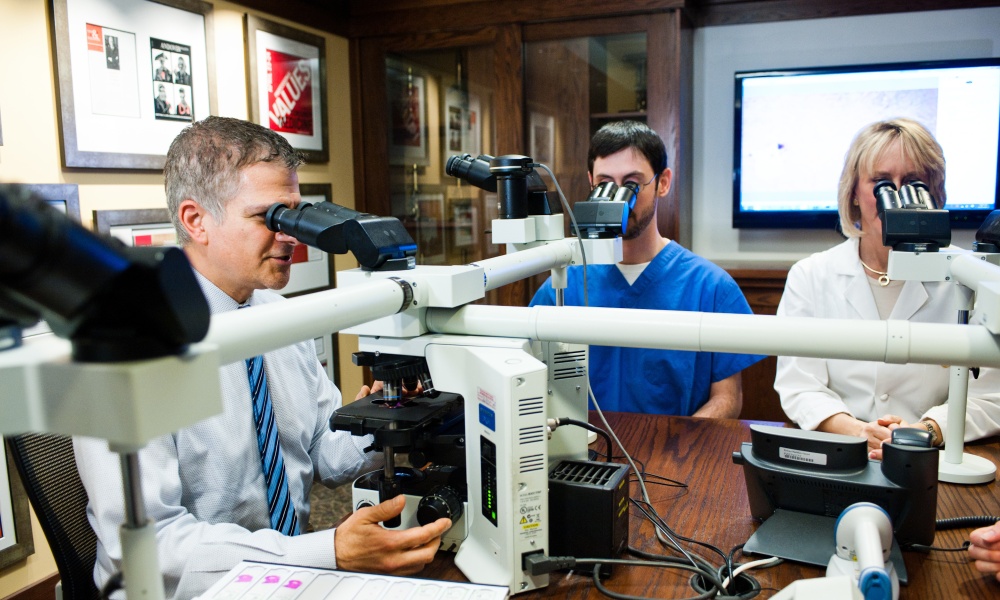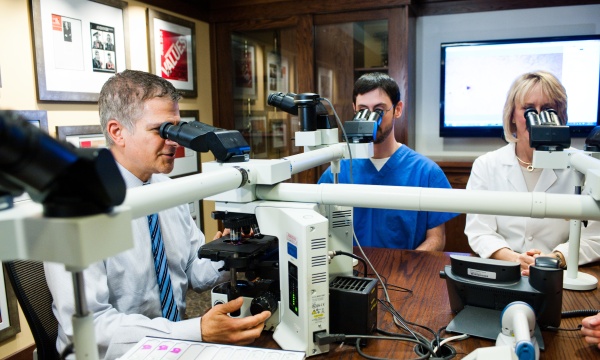Mass General Brigham Hematopathology Training Program


Contact Information
Robert P. Hasserjian, MD
Program Director & Massachusetts General Hospital Site Director
Sam Sadigh, MD
Associate Program Director & Brigham & Women’s Hospital Site Director
Explore This Fellowship
Introduction
The Mass General Brigham (MGB) Hematopathology Fellowship program represents a merger of the two strong longstanding fellowship programs at Massachusetts General Hospital (MGH) and Brigham and Women’s Hospital (BWH) and seeks to train individuals who will become leaders in the field of hematopathology. The MGB fellowship offers its fellows comprehensive training by experienced and well-known diagnostic and research hematopathologists, whose collective expertise spans benign and malignant lymphoid, bone marrow, and blood disorders as well as coagulation, flow cytometry, and molecular hematopathology.
Fellows training at the MGB program are afforded exposure to a broad range of hematologic diseases and research opportunities and have the opportunity to experience hematopathology practice at two different large academic centers. Approximately two thirds of the fellow’s time is spent at the BWH site, which serves as the diagnostic hematopathology service for the Dana-Farber Cancer Institute (DFCI), and one third of the fellow’s time is spent at MGH. Training in all rotations involves consistent exposure to and responsibility for clinical specimens, with supervision and backup from faculty. The trainee’s involvement with challenging consultation cases at both sites gives them insight into some of the most difficult issues in hematopathology diagnosis as well as the important role of academic institutions in making their expertise available to other institutions within the health care delivery system.
MGB Hematopathology fellows interact with clinicians on a daily basis and participate in both intra- and inter-departmental conferences and tumor boards. The fellows are also actively involved with teaching more junior trainees, including BWH and MGH pathology residents and hematology-oncology fellows rotating on the hematopathology service, and interact with other anatomic and clinical pathology subspecialty services at both institutions. Fellows also receive weekly fellow-level didactic training by faculty in the form of lectures and interactive case sessions. The fellows learn to critically evaluate the literature and practice evidence-based medicine and they are encouraged to design and carry out at least one clinical, translational, or basic research project or quality-assurance project during their fellowship year.
Case Volumes
At the BWH site (BWH and DFCI cases), the approximate annual volume is 3,400 in-house bone marrows, 900 in-house lymph node and lymphoma workup tissue cases, and 2,700 extramural consultation cases. At the MGH site (MGH and Massachusetts Eye and Ear Infirmary [MEEI] cases), the average annual volume is 1,600 in-house bone marrows, 600 in-house lymph node and lymphoma workup tissue cases, and 1,200 extramural consultation cases. The flow cytometry laboratory, which serves both BWH and MGH and is located at BWH, has an annual volume of 6,700 cases.
Curriculum
Duration: 1 year
Summary of Rotations:
- BWH In-House Hematopathology (9 weeks)
- BWH Consult Service (14 weeks)
- MGH Bone Marrow service (5 weeks)
- MGH Lymph Node service (5 weeks)
- MGH Coagulation (2 weeks)
- BCH Pediatric Hematopathology (4 weeks)
- BWH Flow Cytometry and Laboratory Hematology (4 weeks)
- BWH Molecular Hematopathology and Cytogenetics (3 weeks BWH)
- BWH/MGH Electives (2 weeks)
- Vacation (4 weeks)
Activities
Educational Activities
Teaching Responsibilities of the Fellow
The fellow supervises residents and medical students rotating on the Hematopathology services at BWH and MGH. Additionally, the fellow presents periodically at the bi-weekly Interdisciplinary Benign Hematopathology Conference (MGH) and Lymphoma Tumor Board (MGH). The fellow presents active cases at weekly hematopathology consensus conferences at both MGH and BWH. While at MGH, the fellow gives 1-2 teaching conferences to hematology lab technologists and also presents periodically at case-based resident teaching conferences.
Educational Activities for the Fellow
The Hematopathology Services and Hematology-Oncology Divisions at both BWH and MGH offer a number of didactic lectures that the Hematopathology fellow attends. These include a weekly didactic lecture and case review series specifically for hematopathology fellows, presented by MGB Hematopathology Faculty. Fellows also attend (and periodically present at) the bi-weekly Interdisciplinary Benign Hematology Conference at MGH and the monthly Dermatopathology-Hematopathology Conference at MGH. Other educational conferences attended by fellows include the multidisciplinary Rapid Heme Panel (RHP) monthly meeting at BWH, which provides in-depth discussions of the molecular diagnostic aspects of interesting or challenging hematologic cases. There is also a didactic hematopathology lecture series for MGB residents, encompassing the entire breadth of hematopathology topics; although geared for the resident level, fellows are welcome to attend these.
The archives of the MGH and BWH Pathology Departments contain hundreds of thousands of cases that are digitally catalogued for retrieval and study by trainees. In addition, the consultation files of the Hematopathology attending staff are available for review and study. Trainees are invited (free of tuition) to attend the many postgraduate courses given by the pathology services at both institutions, including Current Concepts in Surgical Pathology as well as bi-annual Hematopathology and Molecular Genetic Pathology Harvard post-graduate courses.
Fellow Involvement in Research Activities
Fellows are encouraged to do research projects. For most fellows in the 1-year program, the projects will be clinicopathologic in nature, since time for concentrated bench research is not available during the fellowship. Ideally, the project should be outlined early in the training period, based on the fellows’ discussions with their faculty mentor and other faculty. . There are 2 weeks of elective time during which the fellow can focus on research as well as additional time during regular working hours on several of the core rotations.
Supervision
The fellowship incorporates graduated responsibility in all rotations, including making increasingly independent judgements as the year progresses and reviewing cases independently with clinicians. The fellow is given increasing independence as their knowledge grows and commensurate to their increasing diagnostic experience; this includes ‘mock signouts’ weeks (that mimic the role of a hematopathology attending) towards the end of the fellowship. However, the fellow is always supervised directly or indirectly by the attending staff and any clinical decisions require review and/or co-signature by an attending pathologist.
Work-Life Balance and Wellness
The MGB hematopathology fellowship is committed to the well-being of its fellows and aims to maximize the fellows’ time spent on activities that enhance their growth as budding hematopathologists and to minimize as much as possible time spent on activities with less learning value. The MGB Graduate Medical Education office sponsors an annual retreat for fellows, which the Hematopathology fellows attend to enhance their professional development. There are also several social events planned over the course of the fellowship year, so that all fellows can be together away from work.
Career Mentoring
Each fellow is assigned a hematopathology faculty mentor towards the beginning of the fellowship, who meets with them periodically throughout the fellowship to provide advice and guidance. The MGH and BWH Pathology Departments are committed to support their trainees as they seek jobs after fellowship: fellows are encouraged to discuss their job search strategies with the Program Directors and other hematopathologists at both institutions, who help fellows with strategies for interviewing, job talks, and negotiating contracts. Other senior faculty in the departments can also serve as resources in advising fellows on job searches and selection, as well as guiding research-interested fellows to post-doctoral research opportunities following the fellowship. The extensive network of graduates from both BWH and MGH training programs serve as a valuable resource in job placement.
Fellow Eligibility
Eligible applicants must either be graduates of United States or Canadian medical schools accredited by the Liaison Committee on Medical Education (LCME) or hold a currently valid certificate from the Educational Commission for Foreign Medical Graduates (ECFMG).
They should be board-certified or eligible for certification in either Anatomic Pathology, Clinical Pathology, or Combined Anatomic and Clinical Pathology or have completed a Canadian Anatomic Pathology residency. Fellows must have a valid Massachusetts medical license by the time they start the fellowship. MGH or BWH residents in AP, CP, or APCP may also apply to do the Hematopathology fellowship prior to completing residency (but after completing at least 2 years of residency training).
How to Apply
We are currently accepting applications for academic year 2027-2028. We will be participating in the NRMP Match for Hematopathology Fellowship. Please carefully read the FAQs document prepared by the Society for Hematopathology for details, and the timeline is also summarized below.
It is important to note that although we will be participating in the Match, there is no centralized application process for Hematopathology fellowship. Interested applicants should send the below required documents to mgbpathologyfellowships@mgb.org.
- CAP Standardized Pathology Fellowship Application
- Curriculum Vitae (must be in month/year format MM/YYYY)
- Personal Statement describing career goals and hematopathology interest
- USMLE Steps 1, 2, & 3 Score Report (Canadian physicians and Doctors of Osteopathy who are eligible for licensure may substitute documentation of successful completion of LMCC/MCCQE and COMLEX examinations, respectively, in lieu of USMLE examinations).
- Photo
- Three Letters of Recommendation (one letter must be from your current program director or department chair)
- Copy of MD Degree (international medical graduates only)
- Copy of ECFMG Certificate (international medical graduate only)
Timeline for the Hematopathology Fellowship Match
- January 2026: Programs start interviewing
- February 4, 2026: Match opens for registration to programs and applicants
- March 11, 2026: Ranking opens
- April 15, 2026: Rank order list certification deadline
- April 29, 2026: Match day
- July 2027: Start of fellowship
Please note that if you submit an application to either the BWH or MGH Hematopathology Fellowship, you have applied for the same program and the combined MGB Hematopathology Program faculty will review your application; two separate applications are not needed.
Faculty
Program Directors
Sam Sadigh, MD, Associate Program Director (BWH site director)
Program Manager/Coordinator
Carrie L. Racsumberger
cracsumberger@mgb.org
Hematopathology Executive Assistants
Janet Murphy (BWH)
Jeana Kaiser (BWH)
Linda Arini (MGH)
Hematopathology Faculty
Jon C. Aster, MD, PhD (Director of BWH Hematopathology Service)
Kathleen Burns, MD, PhD (BWH)
Ruben D. Carrasco, MD, PhD (BWH)
David M. Dorfman, MD, PhD (BWH)
Judith Ferry, MD (Director of MGH Hematopathology Service)
Megan Fitzpatrick, MD (MGH)
Gabriel Griffin, MD (BWH)
Christopher Hergott, MD, PhD (BWH)
Abner Louissaint, MD, PhD (MGH)
Elizabeth Morgan, MD (BWH)
Valentina Nardi, MD (MGH)
Geraldine S. Pinkus, MD (BWH)
Fred Preffer, PhD (MGH)
Scott Rodig, MD, PhD (BWH)
Vignesh Shanmugam, MD (BWH)
Aliyah Sohani, MD (MGH)
Brianna F. Waller, MD (BWH)
Sarah J. Wu, MD (BWH)
Coagulation Rotation Director
Sasha Ulijon, MD (MGH)
Flow Cytometry and Laboratory Hematology Rotation Director
Daniel Dees, DCLS
Molecular Pathology and Cytogenetics Rotation Director
Pediatric Hematopathology Rotation Director
Jacob Bledsoe, MD (Boston Children’s Hospital)
Pathology Fellowships
Learn more about the fellowships designed to prepare trainees for careers in academic diagnostic pathology.
